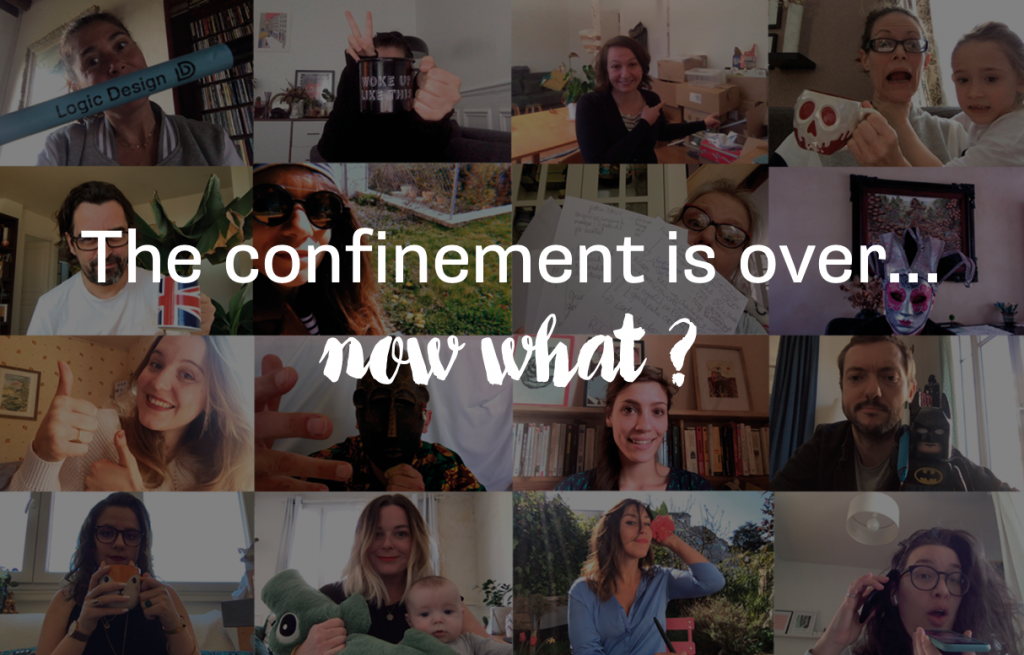Faced with an unprecedented situation, a space for sharing was created. Each week, one of our employees expressed his or her thoughts and feelings. Today, the first interviewee, Jérôme Lanoy, Logic Design’s CEO takes stock and closes the series…. now that he’s back in his office.
What have we learnt from the past three months?
We have collectively demonstrated our ability to adapt. Agility has become a modus vivendi, to rethink our ways of working and values including economic ones.
The issue of switching to remote working was crucial. It has demonstrated certain virtues in terms of speed, thinking and efficiency. It encourages autonomy and leadership. Each subject is dealt with in a timely manner and production timelines are smoother. Gone are the ‘can I have two minutes of your time?’ interruptions that make you lose focus. Gone is the stress and time-wasting with public transport. Working remotely frees up lost time (waiting for a meeting room, a metro) allowing us to take a breath and read economic, cultural and social publications that inspire our thoughts and business.
Also, the last three months has accelerated the digitalization of companies by years
It gave us time to think about the fundamentals. How to set up new tools, work better, communicate with our customers, partners and employees. To imagine we’ll have an ideal future with everyone working remotely is a leap too far, one we don’t want to take.
What are the limits to this new normal?
At Logic Design, the adaptation to confinement was swift and we were operational almost overnight. But management has remained very time-consuming(perhaps even more so?) during this difficult period by keeping in touch, calling our customers one by one and our employees several times a day. However, one month in, people got used to it and that “getting used to it” raises some questions.
The risk is that a certain distrust sets in that damages the global economy (even if not borne out in the figures yet). The crisis can become an excuse to justify the postponement of projects, late payments, not taking meetings….we stop getting together as we’ve lost the habit of travelling around and we enjoy this new comfort. However, working remotely is a useful add-on but not a solution especially when we are dealing with tricky subjects whether it’s client relations or creative work. The two ways of working are not the same. For instance when you use video you can’t see people and documents at the same time plus it’s not easy getting people excited using Zoom or Teams. To have quality exchanges, to inspire and convince, you need to be with the other person!
Picking up on minute signals and feelings is also part of our job. Nobody does this job to produce PowerPoint slides to then share them through a video link. When you know that 90% of communication is non-verbal imagine what you lose when some people mute the sound and camera. We find ourselves preaching in the dark without any feedback, living the nightmarish experience of feeling lost and lonely in the cloud
And the human aspect of the company?
The same can be said about the human interactions in the company. Exchanging points of view, agreeing, feeding off each other…all of this is more difficult without being face-to-face. Certain ‘social norms’ such as chatting at the coffee machine, sticking your head around the door , increase respect and cement human relationships which means it’s more than about the smooth running of projects.
What about tomorrow ?
I must admit I hope we can soon put this period behind us once and for all.
The company is currently using only 25% of its workforce and many of our customers are talking of a September and October restart.
The time is now to get business and the economy moving. However, this can’t happen with remote working. This is particularly so in the communications field where face-to-face exchanges and sharing is vital.
The crisis we are experiencing will have an impact on many levels whether it’s labour laws, working practices or office design. We can clearly see the limits of open-space and isn’t working from home like have your own office? The issues surrounding awful open air-conditioned spaces during a health crisis will become more pressing. Workplace architecture as a general rule, will become more experiential with places for sharing, creativity, human interactions … with collaborative and flexible spaces. Perhaps our very own Open Lab, which was designed on this model, will become the heart of Logic design.
We already have the tools and they’ll continue to evolve. At the agency we’ve integrated new workshop and sharing software. This broadens our client offer in a complementary and lasting manner. We will no doubt witness the return of big screens because our experience tells us the size of the screen and quality of the image affect perceptions. I just had a meeting with two people on-site and a third through video link on a full-sized screen at 1:1 scale…. it changes everything.
I also see a return to offices in urban centres which will become more affordable because we will need less space. So you may as well stay in the centre of town if it’s cheaper.
The agency of tomorrow will mix remote working and face-to-face contact. I would not be surprised if the new norm becomes working two days a week from home which will raise many questions. How do you organise the remaining three days and get the right people together for a project at the same time? What’s the impact on office life and what about the financial ramifications? I’m looking forward to moving beyond this period and the stimulating challenges ahead.
Key words : confinement, quarantine, branding, communication

